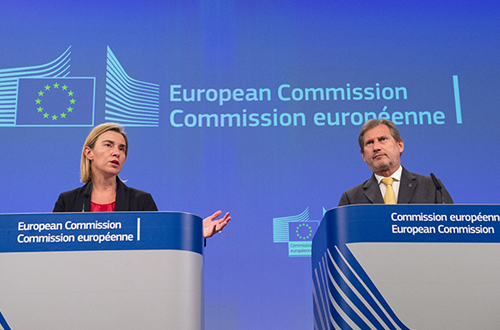| The assessment of the new ENP review |
| / 15 Dec.'15 / 11:09 Mariam Apriashvili |

EU foreign policy chief Federica Mogherini and Commissioner for European Neighbourhood Policy and Enlargement Negotiations Johannes Hahn at a joint press conference on the review of the European Neighbourhood Policy (ENP), Brussels, November 18, 2015. Photo: EU
The ENP review mostly delivers on its promise to propose “how the EU and its neighbors can build more effective partnerships.” The focus on effectiveness seems mistimed as current challenges call for a broader review of the EU vision and purpose.
On November 18, the European Commission and the High Representative Federica Mogherini unveiled a much-awaited Review of the European Neighborhood Policy (ENP). The document appeared as Europe’s neighborhood was descending into violence and uncertainty. The war in Syria, Russia’s military intervention in Ukraine, the refugee crisis, terrorist attacks in Paris and the raise of the radical right all threaten Europe’s security and values.
When the ENP was unveiled in 2004, it covered 16 countries in of the Middle East, North Africa, Eastern Europe, and the Southern Caucasus. Carnegie Europe analyst Stephan Lehne says the policy was based on the idea of building “a partnership with the [ENP] area, founded on the values of the union.”
Since then, most ENP countries grew increasingly unstable and more distant from the values of the EU. Disenchanted, policymakers and academics criticized ENP, calling on the EU to rebuild its credibility by adjusting to the changing reality on the ground.
Focus on tools
Most of the suggested modifications deal with adjusting tools and procedures. The new ENP looks less like a policy and more like a toolkit with the promise “to deploy the available instruments and resources in a more coherent and flexible manner” in a neighborhood.
Ina major move, the review introduces the principles of “differentiation” and “local ownership” between partner countries, abandoning the derided “one-size-fits-all” approach. More tailor-made, differentiated partnerships between the EU and each of its neighboring partners are to reflect different ambitions, abilities and interests of the neighbors. The reviewed ENP speaks of co-operating with those “who have shown less engagement or none at all”, in order “to fit the aspirations better of both sides.” Such differentiation could benefit the more numerous laggards more than the few achievers, authoritarians, rather than democrats.
The EU also promised to change the way it evaluates progress in partner countries. Previous ENP evaluation has been too bureaucratic, rigid and technocratic, with a single set of progress reports destined simultaneously for all ENP partners. These will be replaced by country-specific reporting and more high-level meetings between the EU and partner countries’ representatives. The approach is intended to shift an accent from paperwork to policy. In practice, though this might mean that if a country prefers to focus on a limited number of strategic priorities in relation with the EU, the new framework will be adjusted to these priorities.
Ambitions curtailed
The EU’s most potent modernizing tool – a promise of eventual membership to the fastest reformers – is now off the table. There is neither political interest from the major EU members to expand the union, nor the financial resources to admit new members. The promised integration of the Western Balkans remains a formidable challenge.
The ENP review reflects EU’s deflated ambition. Probe a bit deeper than the welcome technical adjustments, and it becomes clear that during the review process the EU has acknowledged its failure to build a ring of well governed, prosperous and stable states around its borders. The new ENP aims to stabilize, rather than to transform. Diana Potjomkina of the Latvian Institute of International Affairs suggests the EU has “turned towards a more pragmatic, interest-driven and strategic understanding of the neighborhood.”
The new ENP tones down its insistence on common interests and shared values and yields priority to EU’s own, pragmatic interests. Stabilization, inclusive economic development and job creation become the key buzzwords. These priorities echo the current Brussels policy agenda: cooperation in conflict-prevention, counter-terrorism and anti-radicalization policies, energy security and climate, safe and legal mobility and tackling irregular migration, human trafficking and smuggling.
What about the values?
The approach to cooperation with civil society and human rights presented by ENP review document is minimalist and pragmatic, short of lauding the civil society groups as a transformational force. The role of civil society is stressed mostly in the context of the EU communication strategy, which has been widely criticized as inefficient and cumbersome. Brussels also promises to ‘to reach out to broader strata of partner countries’ populations by means of supporting the civil society without going into further detail.
It will worry many civil society groups that the dialogue on democracy and human rights is to be based on agreements with partner state governments, some of which might hardly be interested in such dialogue, while others are willing to monopolize or subvert it.
The EU promises to offer alternative contractual agreements to the countries not interested in AA/DCFTAs. These are likely to be mostly dealing with trade. Armenia, which took a last-minute decision to abandon the AA/DCFTA in favor of the Russian-led Eurasian Economic Union, has already opened talks on a new, enhanced agreement with the EU.
Neighborhood policy survives, just
Through renewed ENP, the EU fails to articulate a new vision for its restive neighborhood. It offers no innovative approaches to achievement in respect to human rights and democracy; and it gives no expectation that the financial resources available for technical assistance will increase until 2020. The policy offers a hand of cooperation to all neighbors, irrespective of their state of democracy, increasing its attractiveness to governments. But it offers little comfort to societies that wish to transform further. Perhaps the Association Agreements and mechanisms linked to them could fill the void.
About the author:
Mariam Apriashvili focuses on Eastern Partnership (EaP) and the European trade policies at the University of Tartu and is currently completing her term at the Sciences Po Paris.
